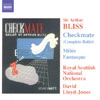Bliss Checkmate; Mêlée Fantasque
Bargain Bliss, and yet another feather in the caps of Lloyd-Jones and Naxos
View record and artist detailsRecord and Artist Details
Composer or Director: Arthur (Drummond) Bliss
Genre:
Orchestral
Label: Naxos
Magazine Review Date: 10/2005
Media Format: CD or Download
Media Runtime: 65
Mastering:
Stereo
DDD
Catalogue Number: 8 557641

Tracks:
| Composition | Artist Credit |
|---|---|
| Mêlée fantasque |
Arthur (Drummond) Bliss, Composer
Arthur (Drummond) Bliss, Composer David Lloyd-Jones, Conductor Royal Scottish National Orchestra |
| Checkmate |
Arthur (Drummond) Bliss, Composer
Arthur (Drummond) Bliss, Composer David Lloyd-Jones, Conductor Royal Scottish National Orchestra |
Author: Andrew Achenbach
Bliss composed Checkmate (the first of his four ballets) at the behest of dancer and choreographer Ninette de Valois to mark the Vic-Wells Ballet’s inaugural visit to Paris in June 1937. A keen chess player, Bliss devised the scenario himself, the original idea having germinated some 14 years before in a dinner conversation with the Russian ballerina Tamara Karsavina. Lasting some 53 minutes, it’s a mightily impressive achievement, scored with sumptuous skill and crammed full of first-rate, colourful invention, much of which will already be familiar from the six-movement concert suite. All the more surprising, then, that Checkmate had to wait until May 2001 for its first complete recording, an enjoyably trim and spirited effort courtesy of the Royal Ballet Sinfonia under Barry Wordsworth’s alert and idiomatic lead.
Now comes an account – in some ways even more compelling – from Naxos stalwarts David Lloyd-Jones and the RSNO, who respond with a commendable polish and ebullient swagger that excite admiration. Both conductors know this score inside-out but Lloyd-Jones’s characteristically lucid conception possesses just that crucial bit more dramatic tension, expressive scope and thrust – and how pliantly he moulds those ravishing melodic tendrils in ‘Entry of the Black Queen’ (where there’s some particularly disarming wind playing). Some occasionally raucous brass sonorities aside, the engineering is enormously vivid, the slightly unflattering acoustic appropriately akin to that of the theatre-pit.
The Mêlée fantasque (written in 1921 in memory of the painter Claude Lovat Fraser, who died tragically young) makes a delightful curtain-raiser, with Lloyd-Jones extracting just that bit more vitality from this by turns exuberant and touching dance-poem than the composer (always an accomplished interpreter of his own music). At such a tempting price, one to snap up without delay.
Now comes an account – in some ways even more compelling – from Naxos stalwarts David Lloyd-Jones and the RSNO, who respond with a commendable polish and ebullient swagger that excite admiration. Both conductors know this score inside-out but Lloyd-Jones’s characteristically lucid conception possesses just that crucial bit more dramatic tension, expressive scope and thrust – and how pliantly he moulds those ravishing melodic tendrils in ‘Entry of the Black Queen’ (where there’s some particularly disarming wind playing). Some occasionally raucous brass sonorities aside, the engineering is enormously vivid, the slightly unflattering acoustic appropriately akin to that of the theatre-pit.
The Mêlée fantasque (written in 1921 in memory of the painter Claude Lovat Fraser, who died tragically young) makes a delightful curtain-raiser, with Lloyd-Jones extracting just that bit more vitality from this by turns exuberant and touching dance-poem than the composer (always an accomplished interpreter of his own music). At such a tempting price, one to snap up without delay.
Discover the world's largest classical music catalogue with Presto Music.

Gramophone Digital Club
- Digital Edition
- Digital Archive
- Reviews Database
- Full website access
From £8.75 / month
Subscribe
Gramophone Full Club
- Print Edition
- Digital Edition
- Digital Archive
- Reviews Database
- Full website access
From £11.00 / month
Subscribe
If you are a library, university or other organisation that would be interested in an institutional subscription to Gramophone please click here for further information.




